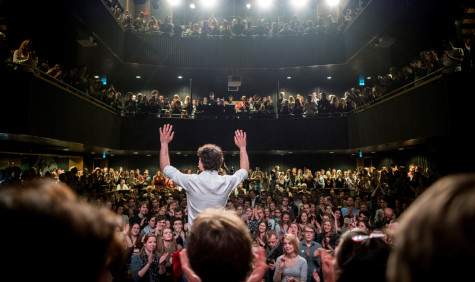The voter's heartbeat
What role do emotions play in the elections? That is what Gijs Schumacher (37) researches as associate professor of Political Science at the University of Amsterdam. "Populism is very adept at mobilizing anger."
Key facts
Who: Gijs Schumacher
Function: Associate professor of Political Science
Organisation: University of Amsterdam
Service provided by SURF: Computing Cluster
Challenge: Analysing millions of political speeches to study the role of emotions in elections.
Solution: Gijs Schumacher utilizes SURF's Computing Cluster to run complex agent-based models, gaining insights into political strategies and voter behaviour.
"Why did we see political parties shift hugely to the right at the beginning of this century? Why did everyone move to the left in the 1970s, while left-wing parties in the 1990s moved to the centre on economic issues? I am researching the strategy and positioning of political parties underlying these developments. Populism is a current element that also influences that political strategy. In all kinds of countries, you saw a rise of radical-right parties in the past decade. And the established parties adapted to that. I find that dynamic interesting."
"Mainstream parties shift to the right because of the success of populist parties. They assume that voters vote for those parties because of the content of their programmes. But actually, we don't really know at all what the motives of people who vote for populist parties are. While they certainly agree with some points, such as strict migration policies, other factors also come into play. Complex factors such as emotions and a politician's personality."
"We therefore study how people actually come to the choice of a party. These are all emotional processes, of course, even if we don't want to admit it, or even happen unconsciously. We also look at what emotional effect political rhetoric has on people and how emotions are deployed by politicians. For this research, I was awarded an ERC Starting Grant of 1.5 million euros, which enabled me to appoint a number of PhD students. We have recently come up with several experiments."
Sweating
"To measure emotion, we look at physiological responses in people watching campaign videos, such as heart rate, facial expressions and sweating. When subjects watch a video from a party they disagree with, their heart rate goes down and they frown. That means they concentrate to tell themselves that what they see cannot be right. A second PhD student is going to see if mimicking, in which people adopt facial expressions of another person, also plays a role in politics."
"Another is going to look at rhetorical aspects of anger versus fear. A lot of political rhetoric tries to turn fear into anger. Because fear mainly makes you seek information, but anger mobilises. So as a politician, you prefer anger to fear. Populism is very adept at mobilising anger because it points very specifically at people who 'did it': "the elite have been keeping the little guy down for years" is very different from saying "we have huge economic problems". Finally, a PhD student is going to look at politicians' use of emotions, for example in texts and variety in pitch of voices."

The Lisa Maths cluster - photographer: Annemiek van der Kuil
Political strategy
"In the past, I have used SURF's Lisa Computing cluster to create a theoretical model of political strategy. Political reality is complex. Political elites make decisions while having uncertain information. And among themselves, they also all interact: when you do something, you don't know how the others will react. With that, the question was: what is the best possible behaviour of parties to best represent their voters?"
"You can model that in the computer with a so-called agent-based model, where you simulate all kinds of different decision steps and see what comes out. How many parties are there, what do they know about their voter, what does the voter think: you can vary all those factors. For that, we literally had to run a few million simulations, and a lot of data comes out of that. Because of all those variables, the number of possibilities increases enormously and you need more and more computing power. The outcome was actually quite simple: if parties take the centre of their voters' views, you have the best representation of your voters in parliament and in government."
"For this model, we had already programmed the code on a laptop in R programming language. To run on Lisa, the script had to be modified a little bit and you have to write a snippet in Unix, but that's relatively easy. It comes with a good explanation. What I also found charming: at one point, we got an e-mail from a SURF advisor, who said: 'I see that you are running this code, but it doesn't run very efficiently because you are only using one of the eight nodes.' He then modified that for us. So it was an easy entry process for me, but of course I am one of the few social scientists who can program."
Emotionally charged words
"Now we are going to do something completely different on Lisa: the PhD student looking at politicians' use of emotions does a lot of text analysis. The standard way to do this is to search speeches for emotionally charged words. With a simple laptop, you can search through a million speeches in a few minutes. But that is a very crude method. After all, words like 'warm' or 'growth' can have different meanings depending on the context, think climate and economy. We are now validating a method to determine sentiment by topic, so that you take into account the context in which a word is used."
"We want a model that maps all the topics from a large corpus of text, say a million speeches in the European Parliament over a few years. Then we look at what the sentiment is in the context of the topic: positive or negative. With a laptop, such an analysis takes a week, at the risk of crashing. By assigning different tasks to different clusters in Lisa, you have the results within an hour."
Text: Josje Spinhoven
Photo: David van Dam | Image Union
'The heartbeat of the voter' is an article from SURF Magazine September 2019
SURF Magazine 3-2019
